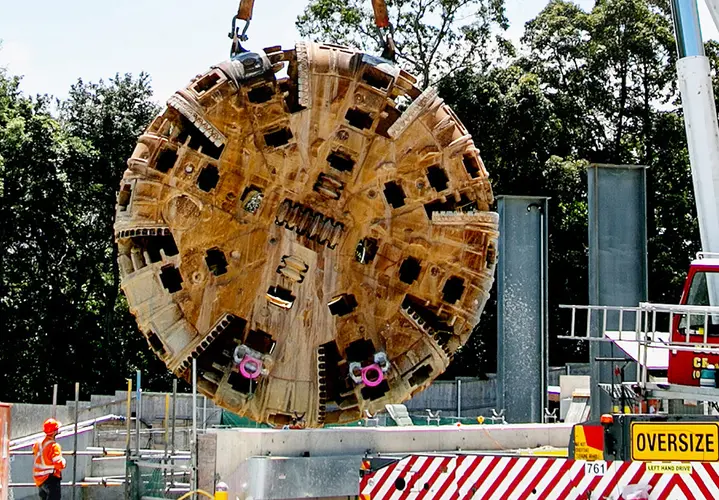TBM4 Maria lifted to the surface at Epping
09.12.2015

Sydney Metro Northwest's second mega machine to finish tunnelling has been pulled out of the ground. A precision operation was required to lift its massive 105-tonne cutter-head 25 metre to the surface at Epping. Tunnel Boring Machine (TBM) 4 Maria ended her nine-month journey from Cherrybrook in late October after digging almost 6 kilometres of Australia's longest railway tunnels. Specialist crews have been dismantling TBM4 since her arrival at Epping following a trip in which she excavated more than 550,000 tonnes of Sydney sandstone and shale and went through more than 450 hardened steel teeth due to the forces of tunnelling. TBM4 was named after 19th century North West Sydney Aboriginal rights advocate Maria Lock (c.1805-1878). The Epping site will be used for fresh air tunnel ventilation and as an emergency access point to the tunnels below once Sydney's new trains start running in the first half of 2019.
Sydney Metro Northwest's second mega machine to finish tunnelling has been pulled out of the ground. A precision operation was required to lift its massive 105-tonne cutter-head 25 metre to the surface at Epping.
Tunnel Boring Machine (TBM) 4 Maria ended her nine-month journey from Cherrybrook in late October after digging almost 6 kilometres of Australia's longest railway tunnels.
Specialist crews have been dismantling TBM4 since her arrival at Epping following a trip in which she excavated more than 550,000 tonnes of Sydney sandstone and shale and went through more than 450 hardened steel teeth due to the forces of tunnelling.
TBM4 was named after 19th century North West Sydney Aboriginal rights advocate Maria Lock (c.1805-1878).
The Epping site will be used for fresh air tunnel ventilation and as an emergency access point to the tunnels below once Sydney's new trains start running in the first half of 2019.